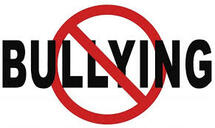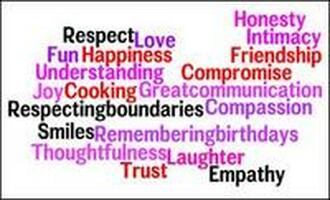Healthy Relationships
|
Research shows that kids have questions about their bodies, puberty, relationships and sexual decision-making, and that they want to get answers to these questions not from the kid next door, but from their parents. Talk to your kids -- openly and honestly. These resources can help:
|
|
Exploring Sexuality
A critical component of adolescent development is the formation of new relationships that feed into the exploration of sexuality. These relationships help teens gain the experience they need for more lasting relationships in the future. As parents, we are vital role models and voices of wisdom for helping our children forge these relationships in ways that are safe and healthy. Whether you're sending an adolescent off to college or back into the social quagmire of middle and high school life, it's good to reinforce some basic information about healthy relationships. When considering romantic entanglements, keep the CERTS model in mind. If you want further information on LGBTQIA relationships, click here. |
CERTS Model:
|
PARENT UPDATE -- Sexuality Communication in Families that Keeps Kids Healthy
Studies show that children who have frequent and open conversations about sexuality with their parents are more likely to make informed, healthy, and responsible decisions about relationships. Planned Parenthood League of Massachusetts’ recent “Let’s Be Honest” presentation by Ana Maria Ramos offered Brookline parents and caregivers information, advice, and resources for creating an environment of trust and comfort in talking about relationships and sexuality at home. Check out the new Parent Update for some of the presentation's key takeaways and a list of helpful links and resources.
Studies show that children who have frequent and open conversations about sexuality with their parents are more likely to make informed, healthy, and responsible decisions about relationships. Planned Parenthood League of Massachusetts’ recent “Let’s Be Honest” presentation by Ana Maria Ramos offered Brookline parents and caregivers information, advice, and resources for creating an environment of trust and comfort in talking about relationships and sexuality at home. Check out the new Parent Update for some of the presentation's key takeaways and a list of helpful links and resources.
TALK ABOUT "DAY OF CHANGE"
BHS SHARP Warriors organized Day of Change on March 13, a day of education and growth regarding topics of consent culture and healthy relationships at our school and in the greater community. The topics being explored can be difficult, so support staff (Guidance counselors, social workers, and deans) was available in the MLK room and social work/counseling suits for students in need. SHARP's goal is to provide clear definitions, create deeper understanding of consent, and build awareness of actions and behaviors that create positive change. Students may want to process some of the information from the day with parents. If you would like to acquaint yourself with the materials the students designed from 2023, here are the links:
9th grade A block
10th grade A block
11th/12th grade A block
Hub Advisory lesson for all grades
This was a powerful panel discussion that occurred at the 2023 event:
https://psbma-org.zoom.us/rec/share/cx19lFPpUzKVfRwvL6xBskYxyt9UiJjIWpV6LjMI5bzZ903nU2sN69oI0pLFFI-L.4w5otg6oTkB7pe4G?startTime=1675865090000 Passcode: #*vr8@4*
Also, SHARP Warriors' presentation “Holding Conversations: Consent, Toxic Masculinity, and Misogyny at Brookline High School” has lots of good info for talking about these concerns.
BHS SHARP Warriors organized Day of Change on March 13, a day of education and growth regarding topics of consent culture and healthy relationships at our school and in the greater community. The topics being explored can be difficult, so support staff (Guidance counselors, social workers, and deans) was available in the MLK room and social work/counseling suits for students in need. SHARP's goal is to provide clear definitions, create deeper understanding of consent, and build awareness of actions and behaviors that create positive change. Students may want to process some of the information from the day with parents. If you would like to acquaint yourself with the materials the students designed from 2023, here are the links:
9th grade A block
10th grade A block
11th/12th grade A block
Hub Advisory lesson for all grades
This was a powerful panel discussion that occurred at the 2023 event:
https://psbma-org.zoom.us/rec/share/cx19lFPpUzKVfRwvL6xBskYxyt9UiJjIWpV6LjMI5bzZ903nU2sN69oI0pLFFI-L.4w5otg6oTkB7pe4G?startTime=1675865090000 Passcode: #*vr8@4*
Also, SHARP Warriors' presentation “Holding Conversations: Consent, Toxic Masculinity, and Misogyny at Brookline High School” has lots of good info for talking about these concerns.

Sexual Harassment & Assault
During B-PEN’s December 2018 Wellness Summit addressing “Teen Sexuality in the Era of #MeToo,” a panel of six Brookline High School Peer Leaders discussed the relationship culture at BHS, where 18% of freshman girls experience sexual harassment, and 1 in 5 girls report having had “sexual contact against their will” by senior year --1 in 12 for boys. (Data was from 2017 Brookline Student Health Survey.) Their top points:
Summit participants, which brought together all sectors of the Brookline community, came up with some excellent strategies to help address some of these issues. Read the report here. Parents of college and soon-to-be college age youth -- and even parents of younger teens -- should be addressing this issue using the concept of CERTS (consent, equality, respect, trust, safety) with kids of all persuasions and genders, acknowledging that alcohol continues to be a major factor in many cases.
During B-PEN’s December 2018 Wellness Summit addressing “Teen Sexuality in the Era of #MeToo,” a panel of six Brookline High School Peer Leaders discussed the relationship culture at BHS, where 18% of freshman girls experience sexual harassment, and 1 in 5 girls report having had “sexual contact against their will” by senior year --1 in 12 for boys. (Data was from 2017 Brookline Student Health Survey.) Their top points:
- Students experience sexual harassment -- pressure to send inappropriate pictures (sexting), unwanted touching, remarks, cat calls -- in the hallways at school, at parties, in relationships, and out in the community (at work, on teams, etc.). It is common behavior (“bro code”) that has become normalized, which makes it easier for it to escalate. Many boys don’t even perceive this as a problem, and it can come down to “he said, she said.”
- In the moment, teens often feel it’s safer to brush it off, walk away, and not call out behavior, which can risk escalating it or starting a cycle of shame/blame or retaliation. Students are afraid to report or even speak up -- perhaps feeling unsure of possible consequences -- so they feel silenced and powerless.
- Unhealthy social media use can stunt the social skills for face to face communication and relationship intimacy and create unrealistic expectations (porn, portrayal of men and women around sex, violent games, etc.)
Summit participants, which brought together all sectors of the Brookline community, came up with some excellent strategies to help address some of these issues. Read the report here. Parents of college and soon-to-be college age youth -- and even parents of younger teens -- should be addressing this issue using the concept of CERTS (consent, equality, respect, trust, safety) with kids of all persuasions and genders, acknowledging that alcohol continues to be a major factor in many cases.

Teen Dating Violence
Sexual abuse among students is increasing, and even if your teen is not dating or is involved in a healthy relationship, the odds are good that he/she knows someone who is struggling. Among Brookline teens, more than a dozen cases of dating violence and sexual assault were reported during the past year. According to national statistics from Planned Parenthood, one in three teens has experienced dating violence or relationship abuse. It crosses all racial, economic and social lines. This pattern of over-controlling behavior from one partner over another isn’t necessarily physical abuse – it can also be sexual, emotional, verbal and psychological abuse as well. It can occur in serious, long-term relationships as well as casual dating situations, and it can effect same sex relationships as well heterosexual relationships. What can parents do? These websites might be a good place to start:
Children under 16 cannot give consent for intercourse. Engaging in sexual intercourse under the age of 16 is considered statutory rape. Children under the age of 14 cannot consent to touching in private areas, such as genitals, buttocks, female breasts, which under the law is considered indecent assault and battery.
Sexual abuse among students is increasing, and even if your teen is not dating or is involved in a healthy relationship, the odds are good that he/she knows someone who is struggling. Among Brookline teens, more than a dozen cases of dating violence and sexual assault were reported during the past year. According to national statistics from Planned Parenthood, one in three teens has experienced dating violence or relationship abuse. It crosses all racial, economic and social lines. This pattern of over-controlling behavior from one partner over another isn’t necessarily physical abuse – it can also be sexual, emotional, verbal and psychological abuse as well. It can occur in serious, long-term relationships as well as casual dating situations, and it can effect same sex relationships as well heterosexual relationships. What can parents do? These websites might be a good place to start:
- Break the Cycle
- LoveIsRespect.org
- National Coalition Against Domestic Violence (NCADV)
- TeenDatingViolenceMonth.org
- Prevention Alliance’s Teen Dating Bill of Rights
Children under 16 cannot give consent for intercourse. Engaging in sexual intercourse under the age of 16 is considered statutory rape. Children under the age of 14 cannot consent to touching in private areas, such as genitals, buttocks, female breasts, which under the law is considered indecent assault and battery.

Bullying
Brookline Public Schools are taking a hard line on bullying. Bullying is defined as the repeated use by one or more students or a written, verbal, or electronic expression, or a physical act or gesture or any combination thereof, directed at a target that:
Here are some additional resources for thinking and talking about bullying when it comes to your teen:
Brookline Public Schools are taking a hard line on bullying. Bullying is defined as the repeated use by one or more students or a written, verbal, or electronic expression, or a physical act or gesture or any combination thereof, directed at a target that:
- causes physical or emotional harm to the target or damage to the target’s property;
- places the target in reasonable fear of harm to him/herself, or of damage to his/her property;
- creates a hostile environment at school for the target;
- infringes on the rights of the target at school; or
- materially and substantially disrupts the education process or the orderly operation of a school
Here are some additional resources for thinking and talking about bullying when it comes to your teen:


